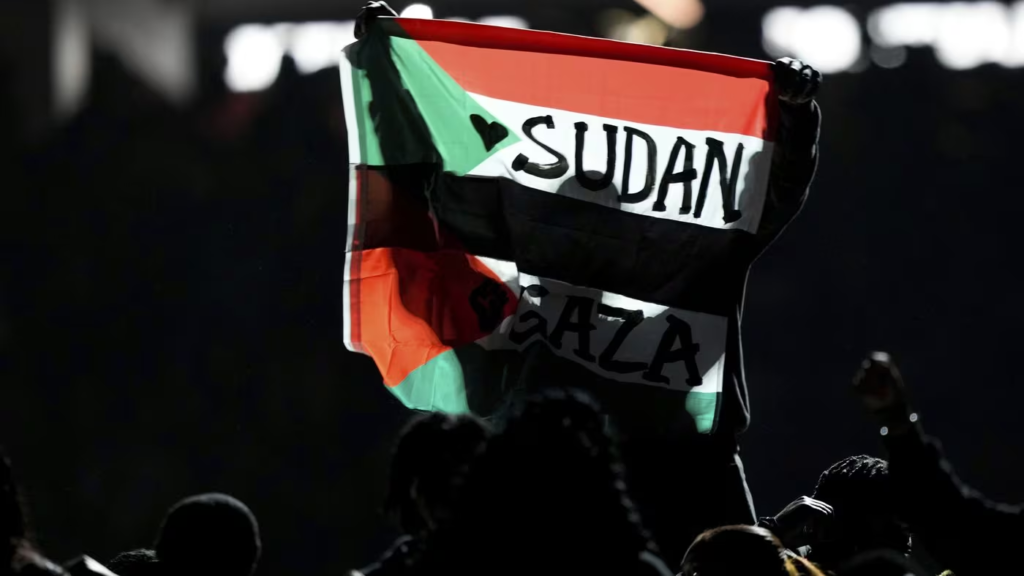The Super Bowl LIX halftime show in New Orleans took an unexpected turn when a performer displayed a banner featuring the Sudanese and Palestinian flags with the words “Sudan” and “Gaza.” The protest lasted nearly 20 seconds before security intervened and detained the individual.
The NFL has since announced that the protester will be permanently banned from all league stadiums. The incident highlighted ongoing humanitarian crises in both Sudan and Gaza and raised questions about political activism at major sporting events.
The Protest at Super Bowl LIX
The protest occurred during Kendrick Lamar’s halftime performance, specifically while he performed “Not For Us,” a diss track widely understood to target rapper Drake.
The unidentified performer climbed onto the hood of a Buick Grand National GNX, holding up a large banner with the Sudanese and Palestinian flags. After unfurling the banner, the individual jumped off the car and ran onto the field, where security swiftly tackled and detained him.
The NFL, in its official statement, clarified that the banner was not part of the planned halftime show. “The individual hid the item on his possession and unveiled it late in the show,” the league stated. Roc Nation, which produced the halftime show, confirmed that neither the production team nor Lamar’s crew had prior knowledge of the protester’s intentions.
Read : Open Quran, Bomb-Making Materials Found at Home of New Orleans Attacker Who Killed 15
While field intrusions at major sporting events are not uncommon, this particular demonstration stood out due to its political nature. Given the high-profile nature of the Super Bowl, the protest ensured that issues related to Sudan and Gaza received global attention, even if only briefly.
The Broader Implications of the Protest
The presence of the Sudanese and Palestinian flags on such a massive platform sparked discussions about political activism in sports. Historically, the Super Bowl has rarely seen direct political protests during its halftime show, though athletes have often used their platform to make statements on social issues.
The protest also brought attention to two ongoing humanitarian crises. Sudan has been embroiled in a brutal civil war for two years, leading to widespread famine, sexual violence, and the collapse of health care systems. The U.S. government recently labeled the conflict as a genocide, further highlighting the dire situation in the region.
This legend has been identified, his Instagram is fff_zulqarnain.
— Suppressed News. (@SuppressedNws) February 10, 2025
He risked everything including his own job during the halftime super bowl show to raise the flags of Palestine and Sudan.
Go to his Instagram and show him support! pic.twitter.com/7zSWiYYPFV
Meanwhile, the Israel-Hamas war has dominated international headlines, with heavy casualties and displacement occurring in Gaza. The protest was the only visible reference to the war during the game, which otherwise remained free from political commentary.
The NFL’s decision to permanently ban the protester from all league stadiums sends a clear message that unsanctioned political demonstrations will not be tolerated at its events.
However, the incident also raises questions about the role of sports as a platform for activism. While some argue that such events should remain apolitical, others believe they provide an opportunity to draw attention to pressing global issues.
Reactions and Aftermath
The reaction to the protest has been mixed. Supporters of the demonstrator argue that raising awareness about humanitarian crises is essential, especially at events with such a massive audience.
They contend that sports have long been intertwined with activism, citing historical examples like Muhammad Ali’s opposition to the Vietnam War and Colin Kaepernick’s kneeling protest against racial injustice.
Critics, however, argue that the Super Bowl is not the appropriate venue for political statements. Many believe that sports should serve as an escape from political and social issues, providing entertainment without controversy.

The NFL’s swift action in banning the protester reflects this stance, emphasizing that the league prioritizes maintaining a non-political environment during its events.
The broader conversation about activism in sports is unlikely to fade soon. With the increasing visibility of global conflicts, athletes and performers may continue to find ways to voice their concerns, whether through sanctioned statements or spontaneous acts of protest.
The Super Bowl protest underscores the ongoing tension between sports as entertainment and sports as a platform for political expression.
Ultimately, while the protester’s actions were short-lived, they succeeded in bringing attention to critical humanitarian issues. Whether the NFL’s hardline stance will deter future protests remains to be seen, but the incident has reignited debates over free speech, activism, and the role of sports in shaping public discourse.

